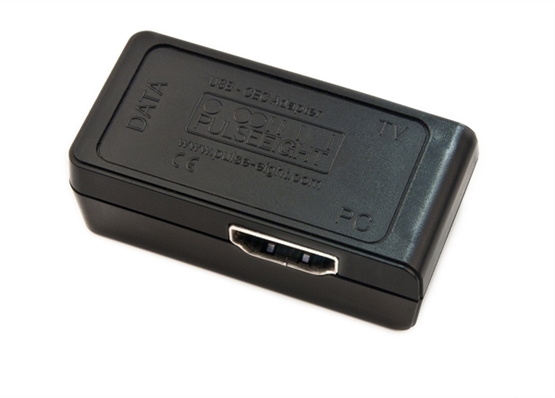1# External CEC adapter 2 3## USB - CEC Adapter from Pulse-Eight 4 5 6 7## Get the hardware 8 9* [Order from Pulse-Eight](https://www.pulse-eight.com/p/104/usb-hdmi-cec-adapter#) 10* [Pulse-Eight USB CEC adapter on Amazon](https://www.amazon.com/s/ref=nb_sb_ss_i_1_22?url=search-alias%3Daps&field-keywords=pulse+eight+usb+cec+adapter&sprefix=usb+cec+adapter+pulse+%2Caps%2C218&crid=UK4LY390M5H2) 11 12## Get the software {#software} 13 141. Connect "TV" port on the adapter to your TV 152. Connect USB mini port to you computer 163. Install the cec-client 17 18 * Linux 19 20 ```shell 21 sudo apt-get install cec-utils 22 ``` 23 24 * macOS (using [MacPorts](https://guide.macports.org/#installing)) 25 26 ```shell 27 sudo /opt/local/bin/port install libcec 28 ``` 29 304. run the client 31 32 ```shell 33 $ cec-client 34 No device type given. Using 'recording device' 35 CEC Parser created - libCEC version 4.0.2 36 no serial port given. trying autodetect: 37 path: /dev/cu.usbmodemv1 38 com port: /dev/cu.usbmodemv1 39 40 opening a connection to the CEC adapter... 41 DEBUG: [ 1] Broadcast (F): osd name set to 'Broadcast' 42 DEBUG: [ 3] connection opened, clearing any previous input and waiting for active transmissions to end before starting 43 DEBUG: [ 10] communication thread started 44 DEBUG: [ 70] turning controlled mode on 45 NOTICE: [ 255] connection opened 46 DEBUG: [ 255] processor thread started 47 DEBUG: [ 255] << Broadcast (F) -> TV (0): POLL 48 TRAFFIC: [ 255] << f0 49 DEBUG: [ 255] setting the line timeout to 3 50 DEBUG: [ 403] >> POLL sent 51 DEBUG: [ 403] TV (0): device status changed into 'present' 52 ``` 53 54## Add timestamps 55 56Use the `ts` command to add timestamps. 57 58```shell 59$ cec-client | ts 60Nov 18 16:15:46 No device type given. Using 'recording device' 61Nov 18 16:15:46 CEC Parser created - libCEC version 4.0.4 62Nov 18 16:15:46 no serial port given. trying autodetect: 63Nov 18 16:15:46 path: /sys/devices/pci0000:00/0000:00:14.0/usb2/2-9 64Nov 18 16:15:46 com port: /dev/ttyACM0 65Nov 18 16:15:46 66Nov 18 16:15:46 opening a connection to the CEC adapter... 67Nov 18 16:15:46 DEBUG: [ 386] Broadcast (F): osd name set to 'Broadcast' 68``` 69 70### ts is part of the moreutils package 71 72```shell 73sudo apt-get install moreutils 74``` 75 76## cheat sheets 77 78* Show all connected devices 79 80 ```shell 81 $ echo scan | cec-client -s -d 1 82 83 ``` 84 85## Available Commands 86 87[tx] \{bytes\} 88: transfer bytes over the CEC line. 89 90[txn] \{bytes\} 91: transfer bytes but don't wait for transmission ACK. 92 93[on] \{address\} 94: power on the device with the given logical address. 95 96[standby] \{address\} 97: put the device with the given address in standby mode. 98 99[la] \{logical address\} 100: change the logical address of the CEC adapter. 101 102[p] \{device\} \{port\} 103: change the HDMI port number of the CEC adapter. 104 105[pa] \{physical address\} 106: change the physical address of the CEC adapter. 107 108[as] 109: make the CEC adapter the active source. 110 111[is] 112: mark the CEC adapter as inactive source. 113 114[osd] \{addr\} \{string\} 115: set OSD message on the specified device. 116 117[ver] \{addr\} 118: get the CEC version of the specified device. 119 120[ven] \{addr\} 121: get the vendor ID of the specified device. 122 123[lang] \{addr\} 124: get the menu language of the specified device. 125 126[pow] \{addr\} 127: get the power status of the specified device. 128 129[name] \{addr\} 130: get the OSD name of the specified device. 131 132[poll] \{addr\} 133: poll the specified device. 134 135[lad] 136: lists active devices on the bus 137 138[ad] \{addr\} 139: checks whether the specified device is active. 140 141[at] \{type\} 142: checks whether the specified device type is active. 143 144[sp] \{addr\} 145: makes the specified physical address active. 146 147[spl] \{addr\} 148: makes the specified logical address active. 149 150[volup] 151: send a volume up command to the amp if present 152 153[voldown] 154: send a volume down command to the amp if present 155 156[mute] 157: send a mute/unmute command to the amp if present 158 159[self] 160: show the list of addresses controlled by libCEC 161 162[scan] 163: scan the CEC bus and display device info 164 165## Sending Remote Control Events 166 167You can send CEC remote events using the `tx` command above. The format is as 168follows: 169 170``` 171tx <source id><destination id>:<command id>:<param value> 172``` 173 174where all of the above parameters should be filled in with a single HEX digit 175(except `<command id>`, which requires 2 digits). Here, we want to send commands 176to the Android TV, so we will place its ID in `<destination id>`. The scan 177command above will give you the IDs for each device that the CEC adapter is 178aware of. 179 180In the examples below the DUT is a CEC player device with a logical address of 1814. Here are some useful commands to execute remote actions: 182 183* Press home 184 185 ``` 186 tx 04:44:09 187 ``` 188 189* Press select 190 191 ``` 192 tx 04:44:00 193 ``` 194 195* Press d-pad up 196 197 ``` 198 tx 04:44:01 199 ``` 200 201* Press d-pad down 202 203 ``` 204 tx 04:44:02 205 ``` 206 207* Press d-pad left 208 209 ``` 210 tx 04:44:03 211 ``` 212 213* Press d-pad right 214 215 ``` 216 tx 04:44:04 217 ``` 218 219You can check out [https://www.cec-o-matic.com/](https]://www.cec-o-matic.com/) 220for more info on formatting your request and a full list of commands and their 221respective parameters. 222